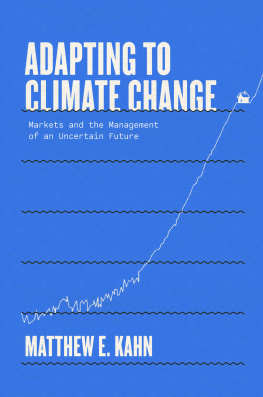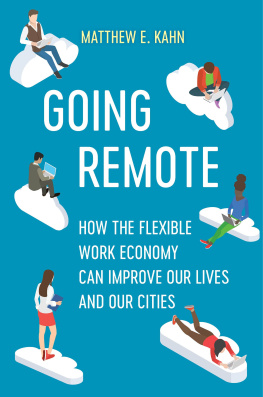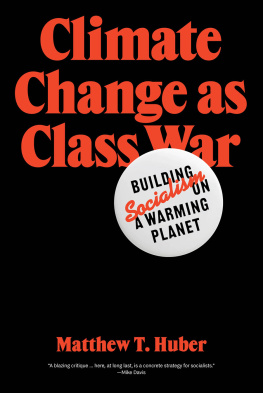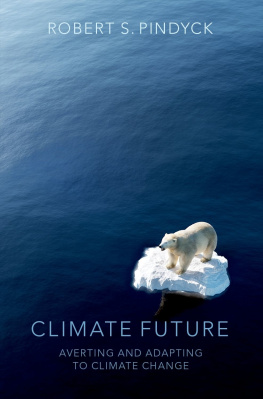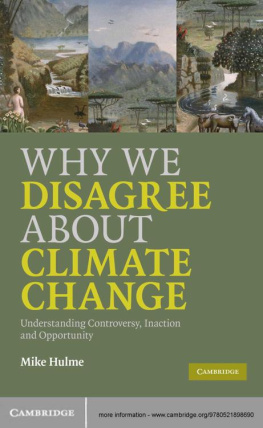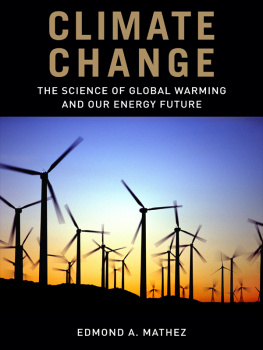Adapting to Climate Change

Published with assistance from the Mary Cady Tew Memorial Fund.
Copyright 2021 by Matthew E. Kahn.
All rights reserved.
This book may not be reproduced, in whole or in part, including illustrations, in any form (beyond that copying permitted by Sections 107 and 108 of the US Copyright Law and except by reviewers for the public press), without written permission from the publishers.
Yale University Press books may be purchased in quantity for educational, business, or promotional use. For information, please e-mail (UK office).
Set in Galliard type by IDS Infotech Ltd., Chandigarh, India.
Printed in the United States of America.
Library of Congress Control Number: 2020944842
ISBN 978-0-300-24671-1 (hardcover : alk. paper)
A catalogue record for this book is available from the British Library.
This paper meets the requirements of ANSI/NISO Z39.48-1992 (Permanence of Paper).
10 9 8 7 6 5 4 3 2 1
Contents
Introduction: Why Adaptation?
I n 1980, the biologist Paul Ehrlich and the economist Julian Simon engaged in a famous debate. Ehrlich argued that ongoing population growth would lead to overconsumption of natural resources and a collapse in food consumption per person. Simon countered that rising scarcity creates incentives to unleash human ingenuity and address the challenge.
Flash forward to the year 2020, when we were confronted by a risk that again posed existential questions. The covid-19 crisis was a wakeup call against complacency about our standard of living. The economic dislocation and disruption of daily life caused by social distancing and other measures taken to reduce the likelihood of infection rocked the global economy to its foundations. A silver lining was that we learned how quickly the world can adjust to shocks that we did not anticipate and for which we were unprepared. But it remains an open question how nimble we will be in responding to future threats.
During the covid-19 pandemic, the challenge of climate change was temporarily displaced from the news. But the challenge has not gone away. This book revisits Julian Simons core hypothesis that human ingenuity plays a central role in reducing climate risk because our ability to adapt is accelerating over time.
Coping with Climate Change Risks
Climate shocks affect people both rich and poor. In December 2017, several fires raging in Southern California destroyed homes and polluted the air. After the fires were put out, several hillside homes in Montecito were wiped out by mudslides triggered by heavy rain falling on bare slopes. The next year, celebrities including Miley Cyrus and Robin Thicke lost homes in the Woolsey Fire in Southern California.
We have two chief strategies to cope with the threat of climate change. First, we can mitigate the threat by reducing our production of greenhouse gas emissions: mitigation represents a type of insurance policy that reduces the likelihood of the most dangerous climate change scenarios. Second, we can adapt to the threat by changing how we live in response to new threats.
This book focuses on the second strategy. It explores how people, firms, and governments can adapt to the new risks posed by climate change, how we can change our lives even as the climate change challenge grows more severe.
Given what we know, the rational strategy in the face of considerable and rising climate risk is to engage in both mitigation and adaptation. But at least in the short term, global greenhouse gas emissions will continue to rise as world per capita income increases. For the billions of people in the developing world who seek a better life, these income increases will be a good thing. However, given current technologies, continued emissions will exacerbate the climate change challenge, which will make adaptation even more important to guarantee future improvements in peoples standard of living.
The Mitigation Challenge
Reducing greenhouse gas emissions will require burning fewer fossil fuels (coal and natural gas) to generate electricity, heat and cool our homes and workplaces, and power transportation services. Yet the global In China, India, and other growing developing nations, the demand for air conditioning, private transport, and energy to power manufacturing is producing ever more greenhouse gas emissions. If China achieves the US rate of car ownership by the year 2070, roughly one billion vehicles will be on its roads. If these vehicles use gasoline as fuel or if they use electricity generated by fossil-fueled power plants, the transportation sector will continue to be responsible for very large and growing quantities of greenhouse gas emissions.
In the absence of a global tax on fossil fuels reflecting their environmental consequences, each consumer of fossil fuels ignores the social costs imposed on others by fossil fuel use. Given that the atmosphere is common property, the economic challenge known as the tragedy of the commons arises. Every nation hopes that every other nation will take costly action to reduce its own emissions. In the face of this free-rider problem, mitigating the climate change challenge has relied on international treaty negotiations. These diplomatic efforts have led to major international events culminating in the Paris Climate Conference in December 2015, which attracted 190 nations and resulted in the Paris Agreement on climate change.
How high global carbon dioxide concentrations will go remains an open question. In April 1958, the global atmospheric carbon dioxide level was 317 parts per million. Over the past sixty years, this level has risen linearly such that, by April 2020, it stood at 416 parts per million. The global carbon dioxide level will likely rise over the next decades due to increased fossil fuel consumption in the developing world.
In the United States and Western Europe, many young people are deeply concerned about the climate change challenge. Inspired by such environmental activists as Greta Thunberg, many youth seek to hold elected officials accountable for their slow carbon mitigation efforts. If new generations of young people continue to prioritize the climate change challenge, a political shift could occur over time as more and more voters in developed nations emphasize the climate challenge.
The diffusion of electric vehicles, especially if significant progress in battery storage technology were made, could alter the steady rise in atmospheric carbon dioxide. Similarly, an increase in the percentage of power generating by clean, renewable sources such as solar, hydro, and wind would reduce the world economys carbon intensity (greenhouse gas emissions per dollar of GNP). Economists broadly agree that the introduction of a carbon tax would accelerate this energy transition.
Despite efforts by the progressive movement and by young people, however, few governments around the world have implemented a carbon tax. Nor have economists convinced elected officials to enact a cap and dividend program that taxes greenhouse gas emissions and then returns the revenue collected to those who consume the most fossil fuels. The challenge is to design a policy proposal that simultaneously puts a price on carbon emissions without lowering the real incomes of those who work in the fossil fuel sector, own assets whose value is tied to fossil fuel use (such as Houston real estate), or are reliant on fossil fuels to live their lives. Such individuals will lose in the short run from introducing carbon pricing incentives, and so far they have fought the introduction of such carbon taxes.
The yellow vest protests in France have highlighted that rural people rely heavily on fossil fuels for transport and for heating services and will oppose policies that will raise the energy prices they pay. Similarly, workers whose income is tied to the extraction and distribution of fossil fuels, such as coal and oil workers, have a financial incentive to oppose carbon pricing, as do the owners of shares of stock in energy companies. In general, having a financial stake in the fossil fuels economy creates interest groups that seek to block new policies to mitigate climate change. Facing this reality, progressives in the US Congress have not recently proposed the introduction of carbon pricing. Instead, they have focused on promoting a low-carbon economy through such regulations as increasing vehicle fuel economy. Individual states such as California, for example, are sharply boosting the legislated share of electricity that must be generated by renewable power.
Next page
